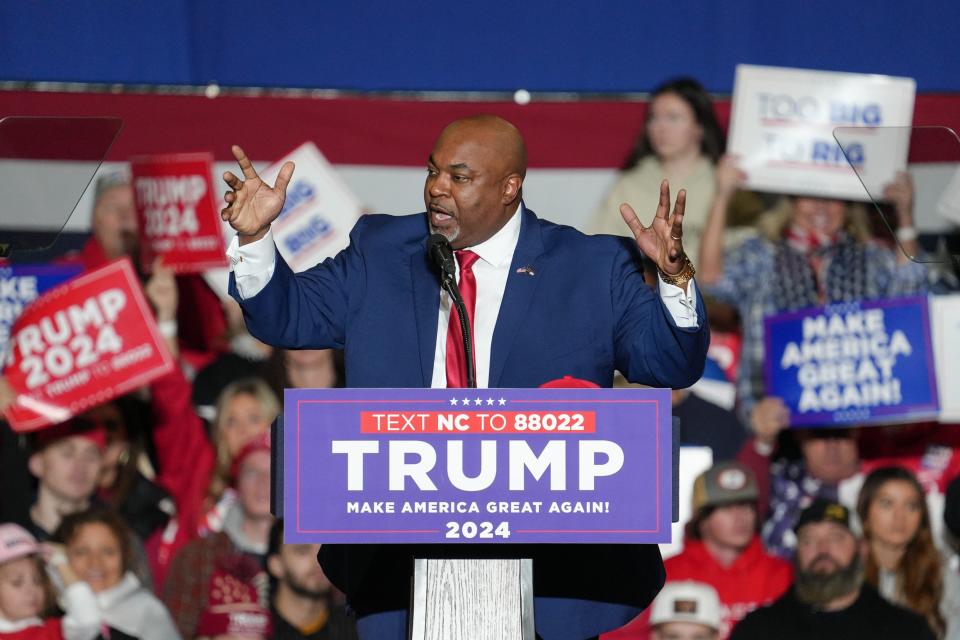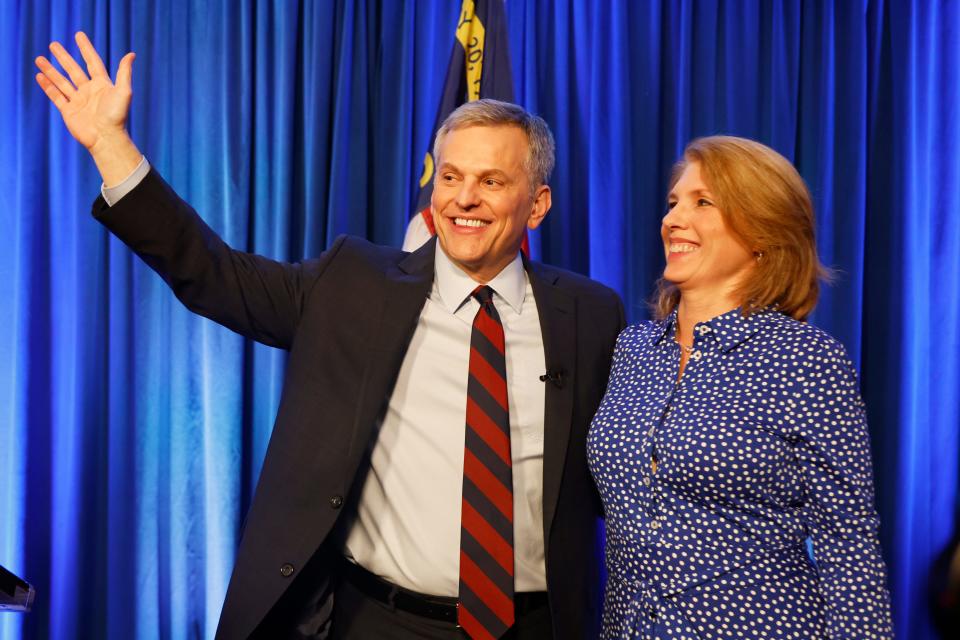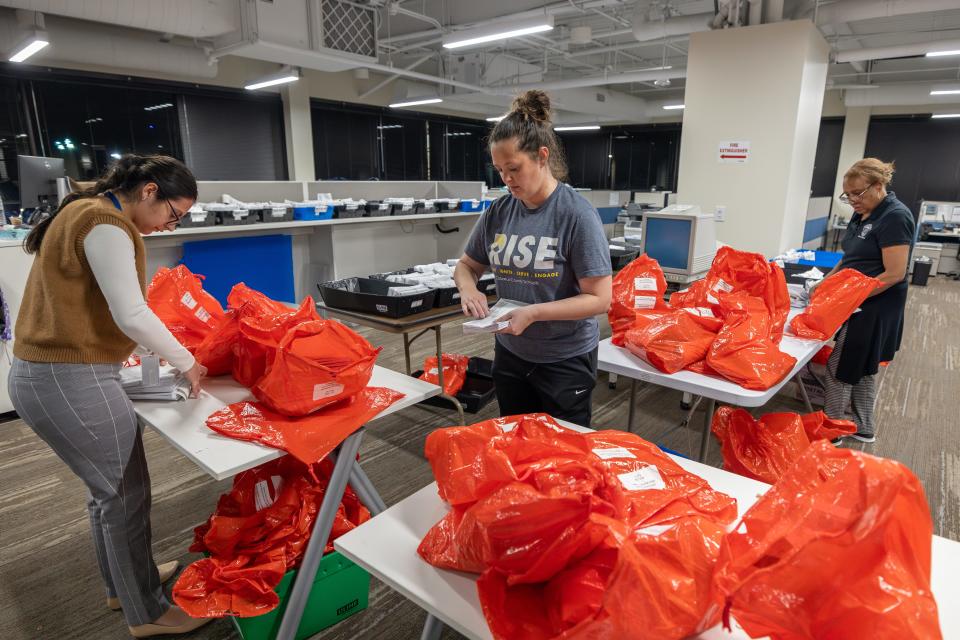North Carolina election officials say primary ran smoothly, but some cite confusion over new laws
CHARLOTTE, N.C. — Election officials in North Carolina said Tuesday’s primary ran smoothly in the face of stricter voting rules, but civil rights advocates assert the changes were difficult for some and will discourage others from turning out this November.
Karen Brinson Bell, executive director with the State Board of Elections, told reporters at a press conference on the morning of Super Tuesday that no major issues with photo ID requirements had been reported.
Bell said that of the 695,000 North Carolinians who voted early, 216 had to cast provisional ballots for reasons related to the photo ID requirement.
“In other words, only about three out of every 10,000 voters had to vote a provisional ballot due to the photo ID requirement,” she said. “We believe this is a strong sign that the word is getting out that you should bring your ID to vote.”
But Cheryl Carter, co-founder of Democracy North Carolina, a nonpartisan voting rights group, said her group received “hundreds” of calls to its election hotline from people who had trouble navigating the changes.
“There was a lot of confusion,” she said. “And if we have anything to say about it, North Carolina is going to get their act together.” A state elections spokesperson did not immediately respond to a request for updated information Wednesday morning.
More: Super Tuesday recap: Trump, Biden pick up big wins; Haley drops out
Tuesday's primary was an early test for new voting rules enacted by Republican legislators in the name of election security ahead high-stakes contests for governor and president.
In 2020, roughtly 75,000 votes ? three tenths of a percentage point ? separated then-President Donald Trump and challenger Joe Biden. Analysts expect another close race, and national Democrats are looking to flip the state in November.
Democrats and their allies have slammed the new rules as an attempt to discourage racial minorities and poorer residents from turning out in a state that is shifting demographically.
What are North Carolina's new voting rules?

North Carolina was one of several states to pass stiffer measures in the wake of former President Donald Trump’s baseless claims of election fraud in 2020, according to the Brennan Center for Justice.
The state legislature implemented a series of new election laws, including a stringent voter ID law. Although that change was first passed in 2018, it stalled in the courts and was ultimately revived by the conservative-leaning state Supreme Court.
More: In North Carolina, vote will be a test of new, tighter election laws – and of voters' faith
Other changes now ban ballot drop-boxes, put tighter limits on mail-in ballot returns and eliminate the three-day grace period for ballots delivered late ? even if they were postmarked by Election Day.
“I was horrified when they did that because we all know that the post office is not always reliable,” North Carolina Secretary of State Elaine Marshall, a Democrat, told USA TODAY.
“I believe if a voter has filled out their ballots and dropped it in the mail that they intended to vote, and it should be counted when the delay is not due to anything the voter did.”
Related: Nikki Haley drops out of 2024 GOP race after disappointing Super Tuesday
Yet, many North Carolina conservatives wanted the law to go further, as widespread election distrust remains rampant on the right. Some have argued that installing stricter voting laws will help North Carolinians feel more confident in the state’s elections.
A national Associated Press-NORC Center for Public Affairs poll last year found less than a quarter of Republicans have high confidence that presidential election results will be counted accurately.
And along with the new laws, North Carolina voters also grapple with recent redistricting, and administrative changes that give greater leeway for partisan poll watchers at election sites.
Some voting advocates worry about deterring infrequent voters

The changes have some experts and advocates concerned about turnout.
C.J. Brinson, a Greensboro pastor and organizer with Down Home N.C., said he didn’t hear much about the photo ID law keeping people away from polling places on Tuesday. “People who vote are going to do what they need to do to vote,” he said.
But Brinson warned that the new rules might pose a barrier to infrequent voters who aren't familiar with the changes. “What we're facing is how do we galvanize those who are disenchanted,” he said. “That's a big fear. How do we get them to take this extra step and to take this serious?”
Other voters, activists and poll workers told USA TODAY they had not encountered any issues with voters lacking the proper ID by mid-afternoon Tuesday.
Collette Alston, chair of the North Carolina Democratic Party’s African American caucus, was making the rounds to precinct locations in Charlotte. She said she had not uncovered any problems, crediting the party’s voter education efforts.
More: Southern Democrat vs. MAGA Republican: Why NC governor race is a defining contest for 2024
“We did a good job of getting out in front of the issue before it became an issue,” Alston said. “So, we pretty much had everything in place in order to get ready for today, and for November for that matter."
Tanya Lewis, who was volunteering for the Democratic Party outside of a different polling station, said she similarly had seen no issues.
“I see people coming up. They have their ID already in their hand. They have the voter card,” she said. “I think the issue is, who didn't come because of the voter ID law?”
Carter, the voting rights advocate, said the state elections board needs more funding to train local poll workers.
“If somebody's going in there, and they're taking the time — whether they're taking time off of work, or their busy lives, whatever they're doing — we want to make sure their voting experience is one that's positive,” she said.
'We gotta show ID for cigarettes and alcohol. Why not for voting?'
Karen Stokes, a 59-year-old teacher and Charlotte resident, said she didn’t have any problems voting but saw some people arrive at her precinct without the necessary ID. She said she opposes the changes to North Carolina’s voting laws.
“If you're a homeless person you might not have an ID. Should we punish them for that? I don't think so,” she said.
But others said the new voter ID requirements were justified.
Maxine Carr, a 71-year-old retiree who voted for President Joe Biden at Briarwood Elementary School in Charlotte, said she had no issues casting her ballot. She doesn’t have any problem with requiring voters to show identification.
“We gotta show ID for cigarettes and alcohol,” she said. “Why not for voting?”

'It's going to hurt the elderly'
Joseph Smith, 66, agreed that the requirements were reasonable.
“I understand some people don't have IDs, and I understand that it's going to hurt the elderly, probably, more than anybody,” said Smith, a registered Democrat.
“They should be able to show something that's got their picture on it... at least, you know, a social security card or something that says that they're a citizen. I don't see nothing wrong with that.”
Baily Ulm, a 28-year-old Raleigh resident who voted in the Democratic primary, said the new laws were not a roadblock for her.
“I didn’t have any issues with it today,” Ulm said. “I do think that it does limit the number of people that can vote. Being 18 plus, it’s a privilege to have a license and so I think if the identification was not required, I think more people would get out to vote, especially in the primaries.”
Eli Edds, 20, who voted in the Democratic primary in Raleigh, said having his ID with him was nothing out of the ordinary.
“I didn’t consciously think of it,” he said. “But I always have my ID on me.”
This article originally appeared on Des Moines Register: New voter ID laws get tested in North Carolina's Super Tuesday primary
Solve the daily Crossword

